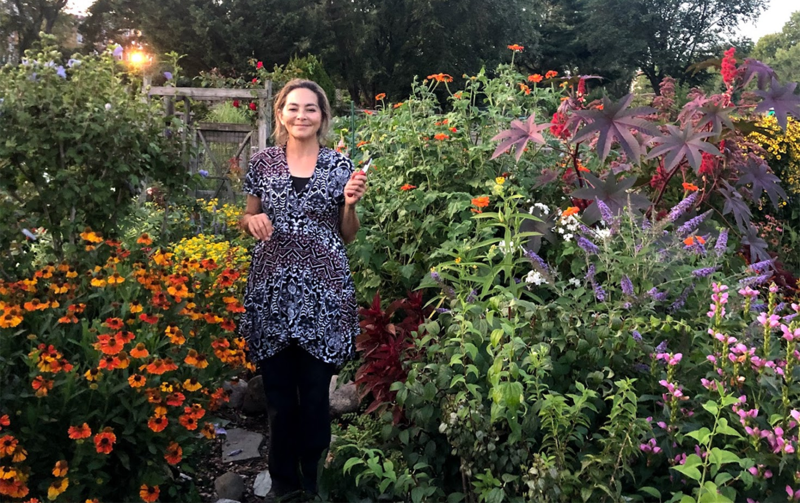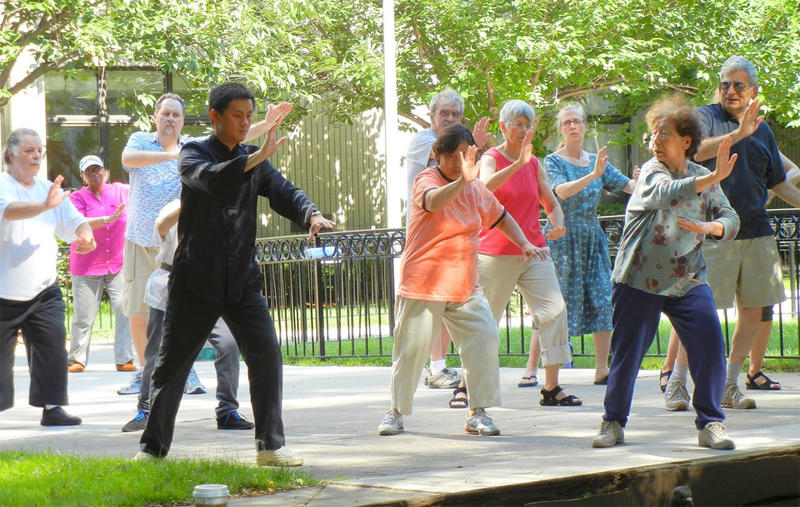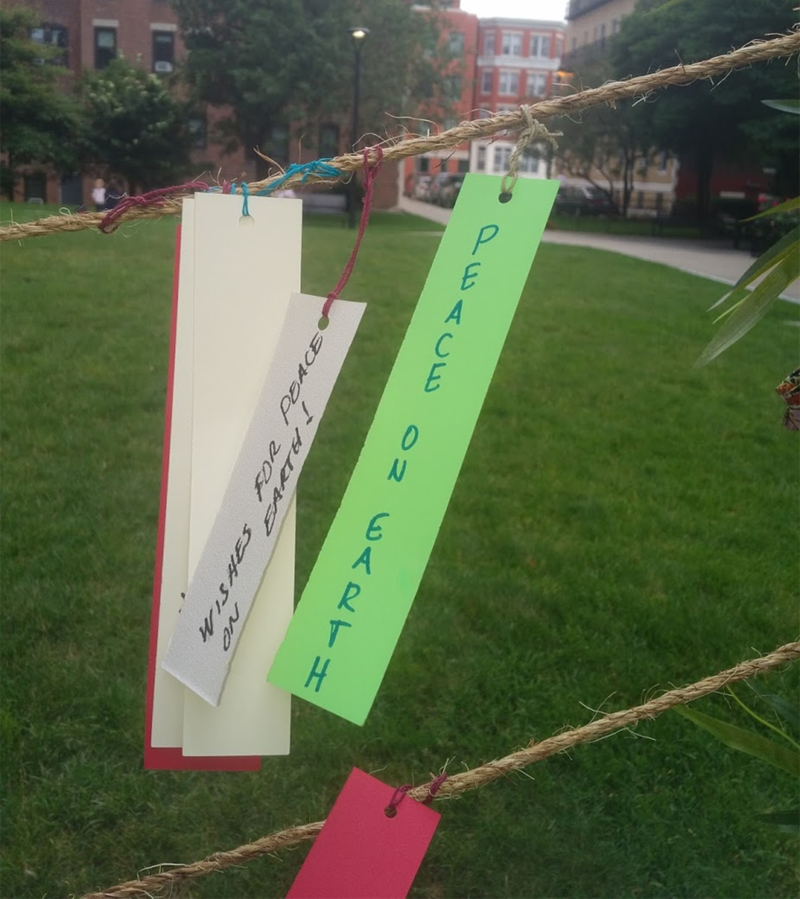Celebrating Asian American Pacific Islander Heritage Month with 'Parkie' Marie Fukuda
For her insights on Asian American Pacific Islander (AAPI) Heritage Month, we recently spoke with local parks advocate Marie Fukuda who has long been active in the Fenway community.
Tell us a bit about your own AAPI heritage.
My mother is American, and my father was Japanese. I was born and raised in Tokyo as one of six kids in a bi-racial family. We grew up speaking Japanese with our grandparents but English at home and at the international school we attended. Both my parents were consummate volunteers — alongside many other accomplishments, my father started an outreach food program for homeless populations, and my mother at 85 still delivers food every week to individuals at 4:30 in the morning! My dad also assisted the Asian Rural Institute, which brings scholars together to learn about sustainable organic farming practices. When I call my mom weekly, she tells me about her daily sweeping of the road in front of her home, (including her neighbor’s areas), and her hobby/mission of taking a bag out to her local park to make sure it stays weed-free. She was a daughter of an amateur rose hybridizer who was a founding member of the Rose Hybridizer’s Association — and we were all raised to love plants and learn their Latin names.
It sounds like you were aware of the importance of open space from a very young age.
I think both my culture and my family values influenced my involvement in open space which is in short supply in Tokyo. Many residents make the most of their apartment exteriors with potted flowers and plants. Because most people live in small spaces, the public realm is an important resource to all. Nature is also built into aesthetic principles, such as the spring cherry blossoms that bring celebration of the beautiful but transient qualities of human existence. Collaboration and cooperation are key values that are stressed. There is also an acceptance that imperfection and problems are part of life while efforts to strive for improvement are valued.
Boston is noted for its abundant open space, how do you compare your experiences here to Tokyo?
Living in Boston has been a wonderful experience. I’ve been able to have a community garden in the Fenway Victory Gardens, I’ve also been able to enjoy the outdoors hiking throughout New England with my husband. During the COVID lockdown we’ve relished the beauty of the Trustees of Reservations properties, the Audubon sanctuaries, and other local trails. I love all four seasons here, from the spring bulbs at the Public Garden to summer harvests at community gardens to our famous New England fall with its vibrant leaves. And — winter!
Tell us about your own involvement in Boston’s open spaces.
One of my most memorable experiences was facilitating the community-driven improvements at Symphony Park. So many hands made that happen, including COG Design, Jon Pate, our elected representatives and the funders, and the many residents who helped make the dream a reality. The parks community here has been incredible. I have learned a lot through volunteer work and have had great experiences, supporting tree planting initiatives and participating in the early Boston Urban Forest Coalition, supporting the Boston Park Advocates network where I currently serve as steering committee member, helping on the Kelleher Rose Garden Committee, and volunteering at the Fenway Garden Society, Ramler Park, Harry Ellis Dickson Park, and Symphony Park. I am most grateful to have learned the many ways through which open space helps build and maintain community health. There are many open space heroes in the city who have helped me, and I have learned so much from them.
Have you been able to integrate your own cultural heritage into your work advocating for clean, green, and safe local parks?
I was thrilled to bring tai chi classes, with the help of Sifu Huan Zhang and Stephen Baird, to Symphony Park. We activated the park with classes long before we had the means to restore it, with the idea that bringing positive activity would help build a sense of ownership and empowerment with stakeholders and residents. We had many supporters who matched City funding to keep these classes going across the years, and although we stopped during the pandemic, hope to bring them back.
So presenting tai chi surely appeals to both those who appreciate enjoying part of their own culture as well as newcomers looking for healthy outdoor activities.
Offering classes like tai chi to everyone helps invite and promote diversity and increases understanding across cultures. This worked so well for us that residents started their own peer-led classes, including fan dancing in the park! I was equally excited when Kate Finnegan of Kaji Aso Studio proposed a Tanabata/Star Festival event during the pandemic. This well-loved summer festival in Japan celebrates the meeting of two celestial lovers who meet across the Milky Way only once a year, with celebrants writing “wishes” on pieces of paper to send up to the heavens.
Given the unfortunate surge in attacks on people of Asian descent, can you share your thoughts on the #StopAsianHate campaign?
As a biracial person, I have experienced racism in both of my heritage countries, and while I consider myself to be privileged and still learning about systemic racism and its impacts here, I encourage everyone to become part of the movement to support AAPI communities and ANY community or group that encounters unjust treatment. These are people’s grandmothers, grandfathers, sisters, brothers — no one deserves this treatment. I am proud to join those who came to the US from other countries and hope I can work to contribute to its future the same way they have. For those unfamiliar with Asian culture, please understand that microaggressions exist and hurt too — just because someone raised in another culture is quiet, it does not mean they do not have opinions or cannot be leaders. Please be open to, and curious about, each other.
As we near what appears to be a full reopening after a year of social isolation, do you have any closing thoughts to share with us?
Yes — visit your local park! If you see someone working there, ask how you can get involved — you will be surprised at how happy they will be to talk with you. Make sure to check out the Boston Park and Recreation Department’s calendar and social media pages. There are so many events and programs that offer arts and healthy living programs — and they are free!
And finally, if you don’t know anything about Japanese culture, take some time to visit Kaji Aso Studio in the Fenway. They offer events and classes such as calligraphy, tea ceremony, haiku, and more!




